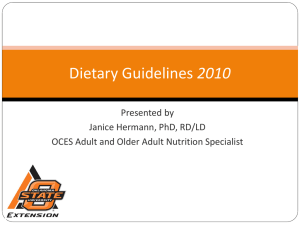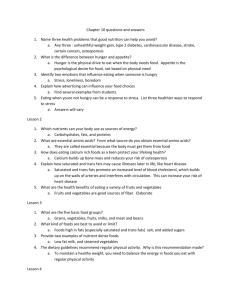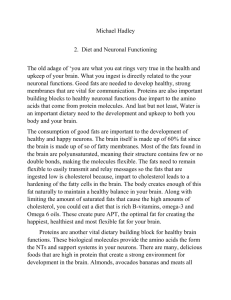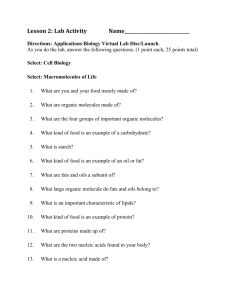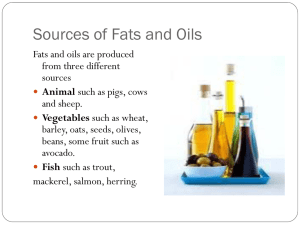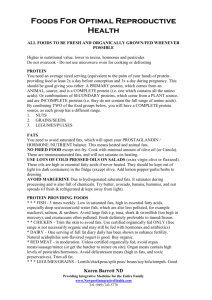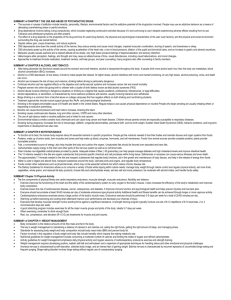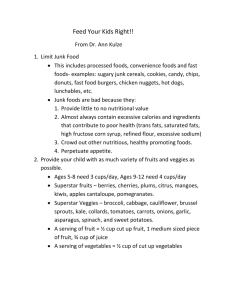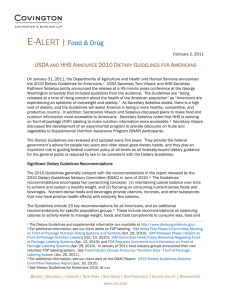Executive Summary - Weston A. Price Foundation
advertisement
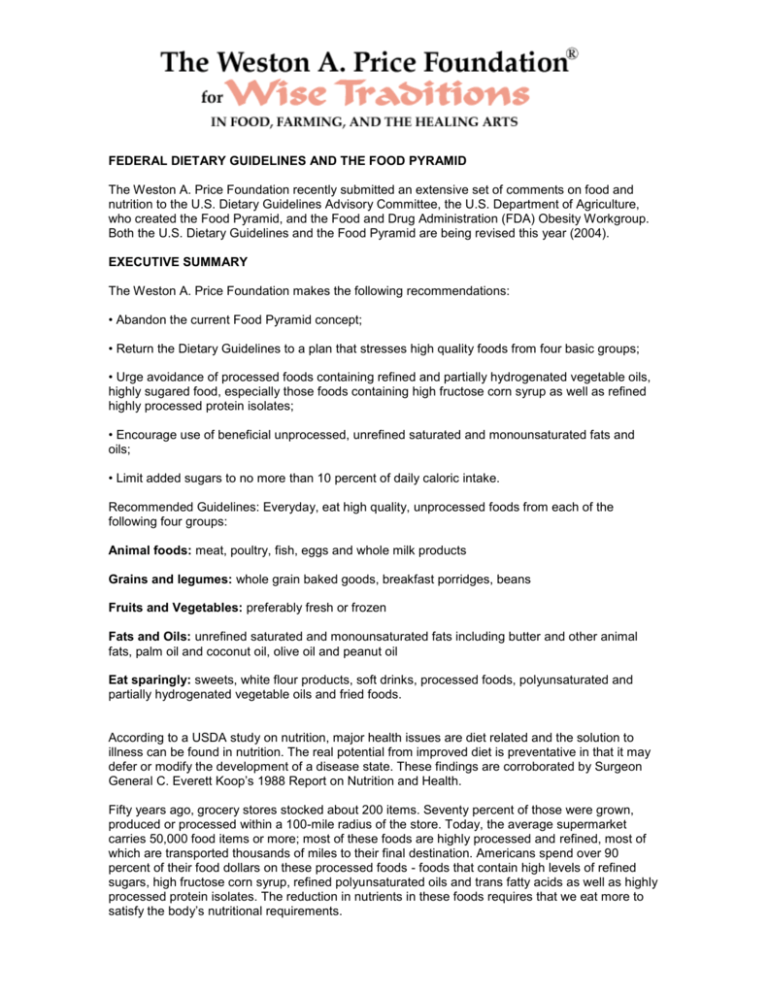
FEDERAL DIETARY GUIDELINES AND THE FOOD PYRAMID The Weston A. Price Foundation recently submitted an extensive set of comments on food and nutrition to the U.S. Dietary Guidelines Advisory Committee, the U.S. Department of Agriculture, who created the Food Pyramid, and the Food and Drug Administration (FDA) Obesity Workgroup. Both the U.S. Dietary Guidelines and the Food Pyramid are being revised this year (2004). EXECUTIVE SUMMARY The Weston A. Price Foundation makes the following recommendations: • Abandon the current Food Pyramid concept; • Return the Dietary Guidelines to a plan that stresses high quality foods from four basic groups; • Urge avoidance of processed foods containing refined and partially hydrogenated vegetable oils, highly sugared food, especially those foods containing high fructose corn syrup as well as refined highly processed protein isolates; • Encourage use of beneficial unprocessed, unrefined saturated and monounsaturated fats and oils; • Limit added sugars to no more than 10 percent of daily caloric intake. Recommended Guidelines: Everyday, eat high quality, unprocessed foods from each of the following four groups: Animal foods: meat, poultry, fish, eggs and whole milk products Grains and legumes: whole grain baked goods, breakfast porridges, beans Fruits and Vegetables: preferably fresh or frozen Fats and Oils: unrefined saturated and monounsaturated fats including butter and other animal fats, palm oil and coconut oil, olive oil and peanut oil Eat sparingly: sweets, white flour products, soft drinks, processed foods, polyunsaturated and partially hydrogenated vegetable oils and fried foods. According to a USDA study on nutrition, major health issues are diet related and the solution to illness can be found in nutrition. The real potential from improved diet is preventative in that it may defer or modify the development of a disease state. These findings are corroborated by Surgeon General C. Everett Koop’s 1988 Report on Nutrition and Health. Fifty years ago, grocery stores stocked about 200 items. Seventy percent of those were grown, produced or processed within a 100-mile radius of the store. Today, the average supermarket carries 50,000 food items or more; most of these foods are highly processed and refined, most of which are transported thousands of miles to their final destination. Americans spend over 90 percent of their food dollars on these processed foods - foods that contain high levels of refined sugars, high fructose corn syrup, refined polyunsaturated oils and trans fatty acids as well as highly processed protein isolates. The reduction in nutrients in these foods requires that we eat more to satisfy the body’s nutritional requirements. The current Dietary Guidelines and Food Pyramid strongly favor a low-fat, high-carbohydrate diet. The caloric proportions of proteins, fats and carbohydrates advocated by USDA’s Food Pyramid and Dietary Guidelines are alarmingly similar to the USDA guidelines for fattening cattle and other livestock. Only during the last century has man’s diet included a high percentage of refined carbohydrates. Our ancestors ate fruits, vegetables and grains in their whole, unrefined state. In nature, sugars and carbohydrates—the energy providers—are linked together with vitamins, minerals, enzymes, protein, fat and fiber—the bodybuilding and digestion-regulating components of the diet. In whole form, carbohydrates support life, but refined carbohydrates are inimical to life because they are devoid of bodybuilding elements. There is no conclusive evidence from epidemiologic studies that dietary fat intake promotes the development of obesity independently of total energy intake. Many researchers now recognize that one of the most important factor in preventing weight gain involves the total amount of calories consumed; when a significant portion of these calories come from healthy fats, the body experiences satiety and overall caloric intake is reduced. During the early 20th century, most of the fatty acids in the diet were either saturated or monounsaturated, primarily from butter, lard, tallows, coconut oil and small amounts of olive oil; heart disease and obesity were virtually non-existent. Today, most of the fats in our diet are polyunsaturated, primarily from vegetable oils derived from soy, corn, safflower, sunflower, cottonseed and rape seed (canola – primarily monounsaturated). Polyunsaturated fatty acids are very fragile. When exposed to heat and oxygen, as during commercial processing, they form free radicals and other harmful breakdown products that damage the human body in many ways. Trans fatty acids in the diet, created from partially hydrogenating vegetable oils, have been implicated as causing or exacerbating most of our modern diseases, including heart disease, cancer, diabetes, obesity, immune dysfunction and bone loss. In addition, a number of researchers have argued that along with a surfeit of omega-6 essential fatty acids from vegetable oils the American diet is deficient in the more unsaturated omega-3 linolenic acid. Animal fats, such as butter, lard and tallows, as well as fruit/nut-derived saturated fats – coconut and palm oils - are stable, do not easily develop free radicals, and contain nutrients that are vital for good health. Children, in particular, require high levels of quality animal fats, such as butter and whole milk products, to achieve optimal physical and neurological development. Naturally occurring unprocessed fruits, vegetables, whole grains and legumes with non-factory farmed animal and fish protein sources are recommended for longevity and well being. Beneficial fats include the primarily saturated butter and other animal fats, coconut and palm oils; monounsaturated fats such as olive oil and peanut oil; and the polyunsaturated omega-3 essential fatty acid from flaxseed oil and fish. Dr. Mary Enig, vice president of the Foundation, testified before the Dietary Guidelines Advisory Committee in January of this year and before the FDA's Obesity Workgroup in October of last year. Bill Sanda, director of Public Affairs for the Foundation, also testified before another meeting of the FDA Obesity Workgroup in December, 2003. The next meeting of the Dietary Guidelines Advisory Committee will be held on March 30 and 31, 2004 in Washington DC. You can obtain more information about the Committee by going to the following link: http://mailhost.groundspring.org/cgi-bin/t.pl?id=77636:2564776. The entire Weston A. Price Foundation comments paper, which is 57 pages, can be downloaded through the following links: In Microsoft Word format: http://mailhost.groundspring.org/cgi-bin/t.pl?id=77637:2564776 or in PDF format: http://mailhost.groundspring.org/cgi-bin/t.pl?id=77638:2564776
